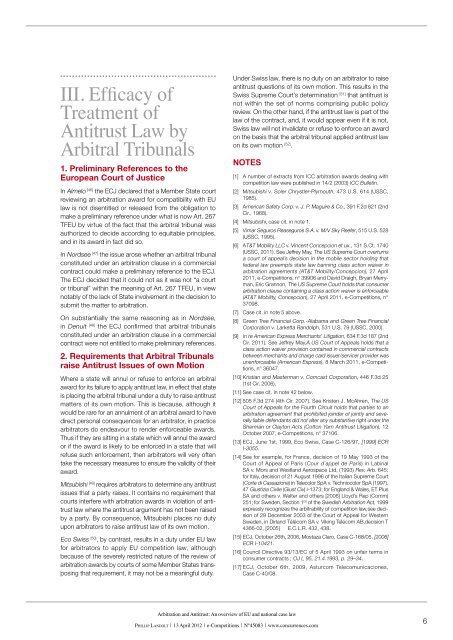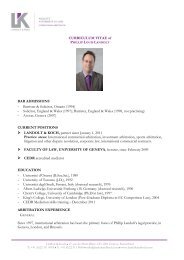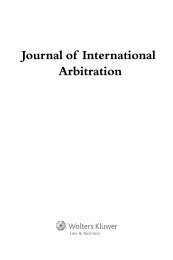Arbitration and Antitrust An overview of EU and national case law
Arbitration and Antitrust: An overview of EU and ... - Landolt & Koch
Arbitration and Antitrust: An overview of EU and ... - Landolt & Koch
- No tags were found...
You also want an ePaper? Increase the reach of your titles
YUMPU automatically turns print PDFs into web optimized ePapers that Google loves.
!!!"#$%&'(')#*%#<br />
Treatment <strong>of</strong><br />
+,-.-/01-#2(3#4)#<br />
Arbitral Tribunals<br />
1. Preliminary References to the<br />
European Court <strong>of</strong> Justice<br />
In Almelo [46] the ECJ declared that a Member State court<br />
reviewing an arbitration award for compatibility with <strong>EU</strong><br />
<strong>law</strong> is not disentitled or released from the obligation to<br />
make a preliminary reference under what is now Art. 267<br />
TF<strong>EU</strong> by virtue <strong>of</strong> the fact that the arbitral tribunal was<br />
authorized to decide according to equitable principles,<br />
<strong>and</strong> in its award in fact did so.<br />
In Nordsee [47] the issue arose whether an arbitral tribunal<br />
constituted under an arbitration clause in a commercial<br />
contract could make a preliminary reference to the ECJ.<br />
The ECJ decided that it could not as it was not “a court<br />
or tribunal” within the meaning <strong>of</strong> Art. 267 TF<strong>EU</strong>, in view<br />
notably <strong>of</strong> the lack <strong>of</strong> State involvement in the decision to<br />
submit the matter to arbitration.<br />
On substantially the same reasoning as in Nordsee,<br />
in Denuit [48] the ECJ confirmed that arbitral tribunals<br />
constituted under an arbitration clause in a commercial<br />
contract were not entitled to make preliminary references.<br />
2. Requirements that Arbitral Tribunals<br />
raise <strong><strong>An</strong>titrust</strong> Issues <strong>of</strong> own Motion<br />
Where a state will annul or refuse to enforce an arbitral<br />
award for its failure to apply antitrust <strong>law</strong>, in effect that state<br />
is placing the arbitral tribunal under a duty to raise antitrust<br />
matters <strong>of</strong> its own motion. This is because, although it<br />
would be rare for an annulment <strong>of</strong> an arbitral award to have<br />
direct personal consequences for an arbitrator, in practice<br />
arbitrators do endeavour to render enforceable awards.<br />
Thus if they are sitting in a state which will annul the award<br />
or if the award is likely to be enforced in a state that will<br />
refuse such enforcement, then arbitrators will very <strong>of</strong>ten<br />
take the necessary measures to ensure the validity <strong>of</strong> their<br />
award.<br />
Mitsubishi [49] requires arbitrators to determine any antitrust<br />
issues that a party raises. It contains no requirement that<br />
courts interfere with arbitration awards in violation <strong>of</strong> antitrust<br />
<strong>law</strong> where the antitrust argument has not been raised<br />
by a party. By consequence, Mitsubishi places no duty<br />
upon arbitrators to raise antitrust <strong>law</strong> <strong>of</strong> its own motion.<br />
Eco Swiss [50] , by contrast, results in a duty under <strong>EU</strong> <strong>law</strong><br />
for arbitrators to apply <strong>EU</strong> competition <strong>law</strong>, although<br />
because <strong>of</strong> the severely restricted nature <strong>of</strong> the review <strong>of</strong><br />
arbitration awards by courts <strong>of</strong> some Member States transposing<br />
that requirement, it may not be a meaningful duty.<br />
Under Swiss <strong>law</strong>, there is no duty on an arbitrator to raise<br />
antitrust questions <strong>of</strong> its own motion. This results in the<br />
Swiss Supreme Court’s determination [51] that antitrust is<br />
not within the set <strong>of</strong> norms comprising public policy<br />
review. On the other h<strong>and</strong>, if the antitrust <strong>law</strong> is part <strong>of</strong> the<br />
<strong>law</strong> <strong>of</strong> the contract, <strong>and</strong>, it would appear even if it is not,<br />
Swiss <strong>law</strong> will not invalidate or refuse to enforce an award<br />
on the basis that the arbitral tribunal applied antitrust <strong>law</strong><br />
on its own motion [52] .<br />
!"#$%<br />
[1] A number <strong>of</strong> extracts from ICC arbitration awards dealing with<br />
competition <strong>law</strong> were published in 14/2 (2003) ICC Bulletin.<br />
[2] Mitsubishi v. Soler Chrystler-Plymouth, 473 U.S. 614 (USSC,<br />
1985).<br />
[3] American Safety Corp. v. J. P. Maguire & Co., 391 F.2d 821 (2nd<br />
Cir., 1968).<br />
[4] Mitsubishi, <strong>case</strong> cit. in note 1.<br />
[5] Vimar Seguros Reaseguros S.A. v. M/V Sky Reefer, 515 U.S. 528<br />
(USSC, 1995).<br />
[6] AT&T Mobility LLC v. Vincent Concepcion et ux., 131 S.Ct. 1740<br />
(USSC, 2011). See Jeffrey May, The US Supreme Court overturns<br />
a court <strong>of</strong> appeal’s decision in the mobile sector holding that<br />
federal <strong>law</strong> preempts state <strong>law</strong> banning class action waiver in<br />
arbitration agreements (AT&T Mobility/Concepcion), 27 April<br />
2011, e-Competitions, n° 39906 <strong>and</strong> David Draigh, Bryan Merryman,<br />
Eric Grannon, The US Supreme Court holds that consumer<br />
arbitration clause containing a class action waiver is enforceable<br />
(AT&T Mobility, Concepcion), 27 April 2011, e-Competitions, n°<br />
37098.<br />
[7] Case cit. in note 5 above.<br />
[8] Green Tree Financial Corp.-Alabama <strong>and</strong> Green Tree Financial<br />
Corporation v. Larketta R<strong>and</strong>olph, 531 U.S. 79 (USSC, 2000).<br />
[9] In re American Express Merchants’ Litigation, 634 F.3d 187 (2nd<br />
Cir. 2011). See Jeffrey May,A US Court <strong>of</strong> Appeals holds that a<br />
class action waiver provision contained in commercial contracts<br />
between merchants <strong>and</strong> charge card issuer/servicer provider was<br />
unenforceable (American Express), 8 March 2011, e-Competitions,<br />
n° 36047.<br />
[10] Kristian <strong>and</strong> Masterman v. Comcast Corporation, 446 F.3d 25<br />
(1st Cir. 2006).<br />
[11] See <strong>case</strong> cit. in note 42 below.<br />
[12] 505 F.3d 274 (4th Cir. 2007). See Kristen J. McAhren, The US<br />
Court <strong>of</strong> Appeals for the Fourth Circuit holds that parties to an<br />
arbitration agreement that prohibited joinder <strong>of</strong> jointly <strong>and</strong> severally<br />
liable defendants did not alter any substantive right under the<br />
Sherman or Clayton Acts (Cotton Yarn <strong><strong>An</strong>titrust</strong> Litigation), 12<br />
October 2007, e-Competitions, n° 37106.<br />
[13] ECJ, June 1st, 1999, Eco Swiss, Case C-126/97, [1999] ECR<br />
I-3055.<br />
[14] See for example, for France, decision <strong>of</strong> 19 May 1993 <strong>of</strong> the<br />
Court <strong>of</strong> Appeal <strong>of</strong> Paris (Cour d’appel de Paris) in Labinal<br />
SA v. Mors <strong>and</strong> Westl<strong>and</strong> Aerospace Ltd, (1993) Rev. Arb. 645;<br />
for Italy, decision <strong>of</strong> 21 August 1996 <strong>of</strong> the Italian Supreme Court<br />
(Corte di Cassazione) in Telecolor SpA v. Techniocolor SpA (1997),<br />
47 Giustizia Civile (Giust Civ) I-1373; for Engl<strong>and</strong> & Wales, ET Plus<br />
SA <strong>and</strong> others v. Welter <strong>and</strong> others [2006] Lloyd’s Rep (Comm)<br />
251; for Sweden, Section 1 (3) <strong>of</strong> the Swedish <strong>Arbitration</strong> Act, 1999<br />
expressly recognizes the arbitrability <strong>of</strong> competition <strong>law</strong>,see decision<br />
<strong>of</strong> 29 December 2003 <strong>of</strong> the Court <strong>of</strong> Appeal for Western<br />
Sweden, in Dirl<strong>and</strong> Télécom SA v. Viking Telecom AB,decision T<br />
4366-02, [2005] E.C.L.R. 432, 438.<br />
[15] ECJ, October 26th, 2006, Mostaza Claro, Case C-168/05, [2006]<br />
ECR I-10421.<br />
[16] Council Directive 93/13/EC <strong>of</strong> 5 April 1993 on unfair terms in<br />
consumer contracts ; OJ L 95, 21.4.1993, p. 29–34.<br />
[17] ECJ, October 6th, 2009, Asturcom Telecomunicaciones,<br />
Case C-40/08.<br />
<strong>Arbitration</strong> <strong>and</strong> <strong><strong>An</strong>titrust</strong>: <strong>An</strong> <strong>overview</strong> <strong>of</strong> <strong>EU</strong> <strong>and</strong> <strong>national</strong> <strong>case</strong> <strong>law</strong><br />
PHILLIP LANDOLT l 13 April 2012 l e-Competitions l N°45083 l www.concurrences.com<br />
6





